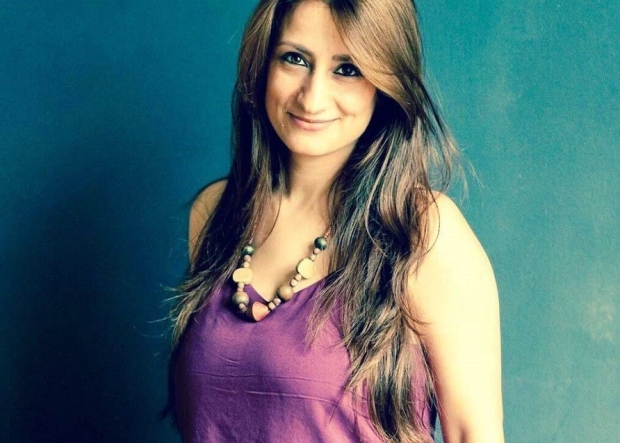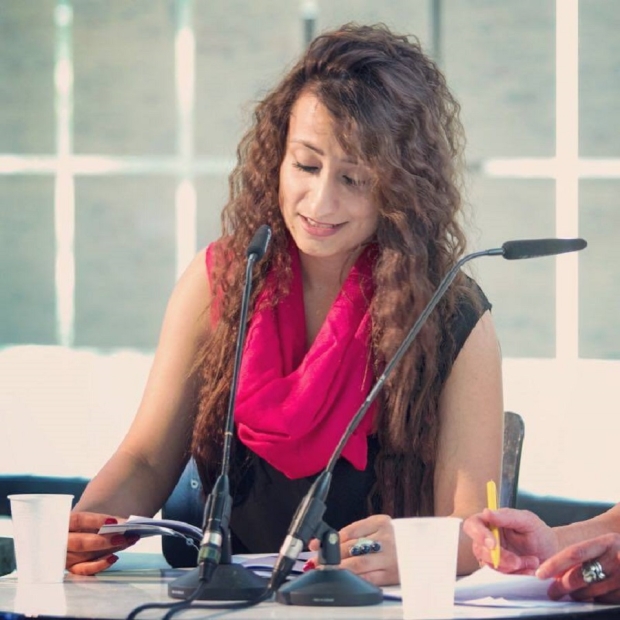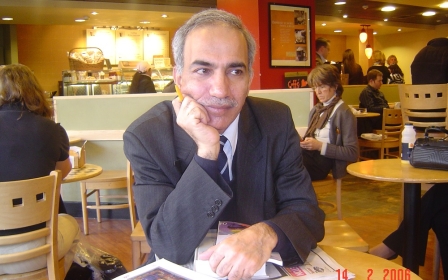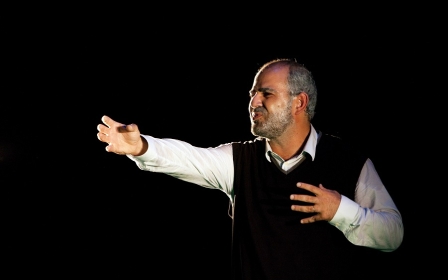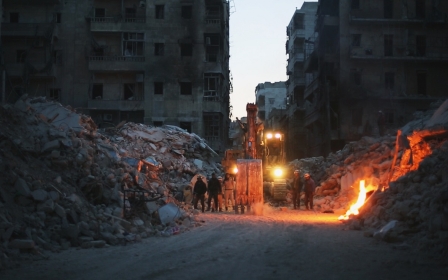Berlin's Syrian poet: 'More than just a refugee'
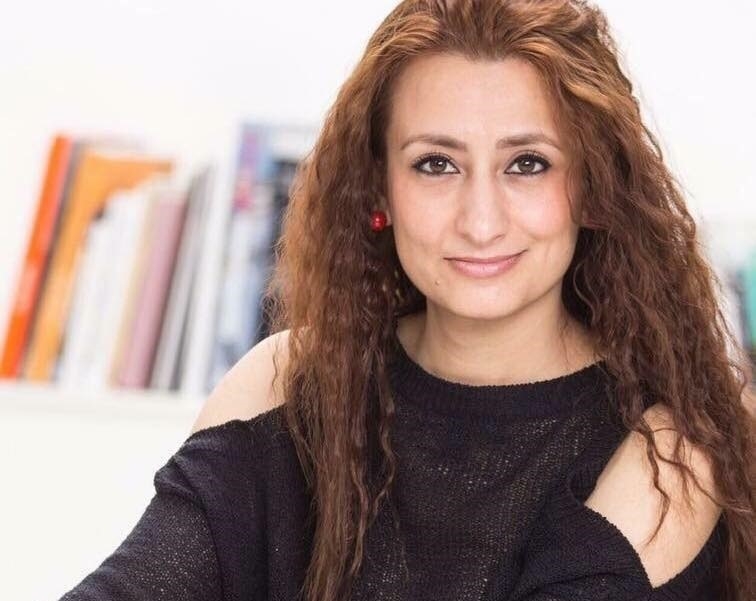
BERLIN – Syrian poet Widad Nabi has established herself as an important figure in literary circles in Germany. At the age of 32, she has published two books of poetry and her work has been translated into German, French and English.
Over the past three years, her life has changed drastically. A vocal critic of the government of Syrian President Bashar al-Assad, in 2015 Nabi was forced to flee her native Syria and escape to Germany.
In 2016, she had her first poem translated in a German anthology titled Weg Sein heir Sein (Be here, be away). Soon after, German publishers and press began translating her other poetry.
Escaping your label
As she established herself in Berlin, Nabi realised there was a lot of interest in Syrian poetry in Germany, and there were opportunities for her and other asylum seekers to produce and showcase their work.
Yet soon it became obvious that much of the interest focused on her identity as a refugee, rather than the quality of her literary output.
“I do not express myself as a refugee; I express myself as a poet and a human,” she said.
I do not express myself as a refugee; I express myself as a poet and a human
- Widad Nabi
Looking to the future, Nabi remains hopeful, even though most journalists and publishing houses seek her out today mainly as a refugee who writes.
“People might meet me now as a refugee, but I hope that in 20 years' time, my writing will remain and my name will be remembered,” she said.
At the same time, she said the pain she has experienced and the struggles she has overcome have helped her writing become “more in touch with wider humanity and [be] more open-minded”.
They hurt me and hung my heart on the top
of the minaret of the Umayyad Mosque.
They tortured my heart
as if it were a bird in the trap of the soldiers who destroyed Aleppo.
They plucked its colourful feathers and laughed.
An excerpt from Nabi's Love is Blue Bruises on the Body, translated by Ali Znaidi. Five of her most recent poems concerning themes of love and war have been published in English by Banipal.
‘Everything was destroyed’
Nabi had originally moved to Syria's largest city to study economics at the University of Aleppo. While living there, she witnessed the early shelling of the city. Many of her family and friends were arrested for protesting against Assad's government, yet she carried on publishing articles about what was happening in Syrian resistance magazines.
It was the sole refuge in the midst of all the death and destruction
- Widad Nabi
Nabi wrote messages on Facebook that went viral in which she “denounced what the regime was perpetrating, the killing and destruction of our lives”.
Though these were terrifying times, she continued to write. She feared soldiers would kick through her door as they had done to her brother-in-law, a prominent activist in the demonstrations.
“I wasn’t able to stop myself,” she said. “It was the sole refuge in the midst of all the death and destruction.”
In 2012, as in much of Syria, waves of protests swept through Aleppo from the university to the city’s fringes. Assad sought to re-establish control over the historic city. Nabi, a Kurd originally from Kobane, decided it was time to go back home to her town near the Turkish border. But when she returned, she saw first-hand how the Islamic State (IS) group had devastated the city.
"I made the decision to leave in search of refuge, the sea, either drowning or survival, in which I would be born again after all the pain and the great labour of war," she added.
Twenty days to Germany
In March 2015, Nabi left Syria to embark on a 20-day journey to Germany. During that time, she says she learned “answers to the meaning of real pain, of migration and being a refugee, of cruelty and the falsehood of humanity”.
She remembers being packed into a smuggler’s truck with 100 others. “It was difficult to breathe or move,” she said. Across from her, a young mother filled with terror held a child on her lap.
If they all died, Nabi thought, would anyone know who they were, other than just more dead refugees? None of them knew the truck’s destination let alone whether they would all survive before the journey ended.
We were a human flock whose fate was controlled by mafias, smugglers and fighters
- Widad Nabi
“We were a human flock whose fate was controlled by mafias, smugglers and fighters,” she said.
One day in Hungary, she was in a forest, cutting down a tree to spark a fire to keep them warm for the night. Suddenly, she saw a large deer moving towards them. A fellow traveller scared the animal away and urged everyone to keep on moving.
With a deer this size, he told Nabi, there would be bigger predators searching for it. In that moment, she realised that "the forest was like the world itself; were we the deer in this harsh forest of humanity?”
Do the coarse fingers
of soldiers who are fighting wars
touch their children’s soft hands?
Did they ever know tenderness?
An excerpt from Nabi's Soldiers are Sleepless Prey, translated by Ali Znaidi.
‘A mere binder of documents’
In August 2015, Nabi arrived in Berlin alongside thousands of other asylum seekers. An initial celebration was quickly pierced by a difficult reality: for six months, she was stuck in a refugee camp in Eisenhuttenstadt on the city’s outskirts.
Like many recent asylum seekers, Nabi was overwhelmed by the complexity of Germany and frustrated with public officials who she described as "condescending". “I had gone from being Widad, the young poetess, into [being] a mere binder of documents,” she wrote in an essay.
In time, she was able to relocate to Berlin and begin a relationship with her new home.
Germany has rolled out "integration courses" which focus on teaching refugees the German language. These courses are free of charge and obligatory for all refugees who gain asylum or subsidiary protection.
Nabi stressed that learning German is not enough. Beyond sharing language, she said it is important to find cultural common ground. In the beginning, in order to meet fellow writers, she roamed the streets of the capital searching for bookshops, libraries and cafes.
As her German improved, so did Nabi’s relationship with Berlin’s literary scene.
Small poem, big impact
Nabi remembers a German story she read as a child called Das Brot (The Bread) by Wolfgang Borchert. The story is about a wife who wakes up late at night to find her husband secretly cutting himself a slice of rationed bread. Without any explicit reference to the outside world, the story’s setting in Germany after the Second World War when food was in short supply only becomes apparent to the reader at the very end. The story encapsulates the way in which war reduces human needs to their most basic and instinctual.
It had a profound impact on Nabi as a teenager and later, as her country descended into war, she often thought back to that story and the unrestrained power of writing.
Nabi believes poetry's power lies in its ability to express human ideas and feelings, a universal language transcending both physical and psychological boundaries between people.
“Even a small poem from a small town in Syria has the power to address people in Africa, in the UK, America, Germany and the whole world,” she said.
For this reason, when Nabi writes these days, she does not address Syrians or Germans. “My writing is public and I know it can touch any human wherever they may be.”
New MEE newsletter: Jerusalem Dispatch
Sign up to get the latest insights and analysis on Israel-Palestine, alongside Turkey Unpacked and other MEE newsletters
Middle East Eye delivers independent and unrivalled coverage and analysis of the Middle East, North Africa and beyond. To learn more about republishing this content and the associated fees, please fill out this form. More about MEE can be found here.


